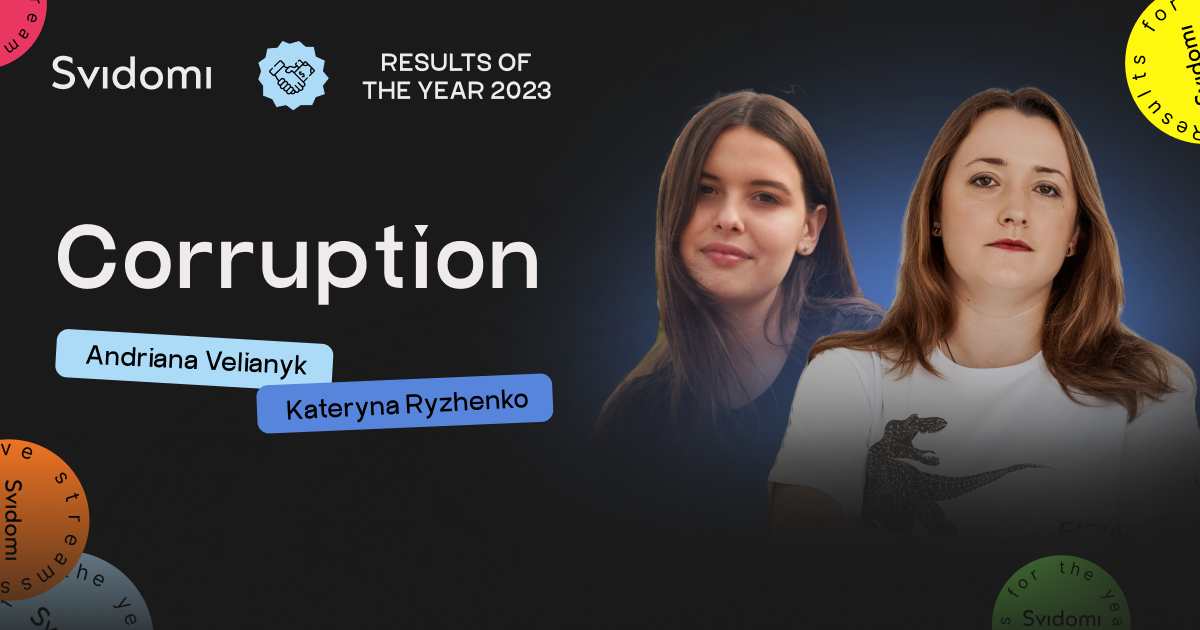Results: Corruption. Kateryna Ryzhenko

For the fourth year in a row, Svidomi online media has been holding summary shows at the end of December to reflect on what has changed in Ukraine over the year in various areas: military, culture, education, foreign and domestic policy.
This time, we discussed the main events of 2023 in the activities of anti-corruption bodies with Kateryna Ryzhenko, Deputy Executive Director of Transparency International Ukraine.
Key results and news of 2023
The opening of negotiations on Ukraine's accession to the EU was crucial not only for the state. The European Council has recognised the success of reforms, in particular in the anti-corruption sector. However, it is only the beginning of the journey.
As part of its European integration, Ukraine has already restored and opened its declarations and passed many bills in the judicial and anti-corruption sectors. Data is generally returning to the public domain.
Growth in the number of corruption cases revealed — an achievement or a failure
Over the past four years, the Anti-Corruption Court has passed more than 150 verdicts. It demonstrates the effectiveness of the anti-corruption system. Such dynamics, including the cases solved in 2023, allow civil society to monitor and control these cases.
A smaller number of cases opened earlier did not mean the absence of corruption. Now, society must understand that such crimes do not remain invisible, and it is impossible to avoid responsibility.
International partners and the fight against corruption in Ukraine
Today, foreign partners and experts have a better understanding of the situation from the inside and feel the mood of Ukrainian society. The parliament can no longer adopt rules that, if interpreted differently, would allow evasion of the law.
The European Commission's reports on reforms in Ukraine, their scope and detail, show that it will be harder to pass "convenient" legislation each time. The recommendations from the US White House, the EU, the European Commission, the International Monetary Fund, and others contain the exact expectations that civil society organisations and experts in Ukraine have been discussing for years. Our partners and I are looking in the same direction in the path of reforms in Ukraine.
As for assistance, we should separate financial and military aid. European integration and macro-financial support will depend on the speed of our reforms. Aid to the army should not depend on such things.
Institutional capacity of anti-corruption bodies
The effectiveness of the High Anti-Corruption Court, the National Anti-Corruption Bureau of Ukraine, the National Agency on Corruption Prevention, the Specialized Anti-Corruption Prosecutor's Office, and the Asset Recovery and Management Agency has increased compared to 2020.
The agencies have been successfully established and launched and have sufficient resources and capabilities, both legislative and practical. The progress is noticeable even though Ukraine has been waiting 2.5 years for the head of the SAPO and even longer for the head of the ARMA.
The work of ARMA Head Olena Duma
Established in 2017, the Asset Recovery and Management Agency (ARMA) is a body that traces and manages seized assets. The turnover of millions of hryvnias that pass through the agency poses a risk of misuse. There have been no achievements or significant changes during the agency's operation. However, it is too early to draw definite conclusions about the work of the new head of ARMA, Olena Duma.
There are warnings about her apolitical nature and independence. In particular, this year, journalists published an investigation into Olena Duma's former advisor, Vadym Hron, who, after his dismissal, came to the agency and escorted visitors there. He was called a "shadow advisor" to the ARMA.
Ukraine should change the procedure for the competition for the head of the agency and introduce an audit of the agency by independent experts, as provided for in the NACP, NABU, and SAPO.
Why real punishment is rarely implemented
Cases against top corrupt officials can take years to be heard. Ukraine's criminal and procedural laws must be improved to make it faster and better.
Anti-corruption bodies have limited capacity. There are not enough judges in Ukraine to hear these cases. The High Anti-Corruption Court has a huge workload because of the trust in this body. However, such a large number of cases sent to the HACC reduces its effectiveness.
In addition, some cases end in classified plea bargains with suspects. There are questions about how many people have been brought to actual responsibility and how many cases have been closed within the timeframe.
How to fight corruption at the state and domestic levels
Apart from developing the anti-corruption ecosystem, judicial reform, and asset recovery, the challenge for the next year will be theft in the reconstruction process.
For example, Ukraine needs to establish a legislative framework for monitoring reconstruction funds through a single accountability system such as Dream.
There have already been first cases by law enforcement agencies. Corruption will be present in reconstruction, but Ukraine must show it can fight it.
Much has been achieved in the fight against corruption at the household level. It is worth remembering that the price of corruption is too high to ignore. As long as most citizens are involved in the defence of Ukraine, we have no excuse not to fight it.


